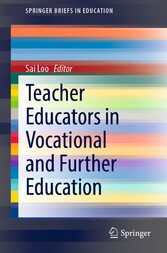
Teacher Educators in Vocational and Further Education
von: Sai Loo
Springer-Verlag, 2022
ISBN: 9783030905026
Sprache: Englisch
151 Seiten, Download: 2229 KB
Format: PDF, auch als Online-Lesen
| Acknowledgements | 7 | ||
| Contents | 8 | ||
| Editor and Contributors | 10 | ||
| List of Figures | 12 | ||
| List of Tables | 13 | ||
| 1 Sweetest Taboo? Further Education and Research | 14 | ||
| Introduction | 14 | ||
| Further Education | 15 | ||
| Structure of the Research Monograph | 20 | ||
| Covid-19 | 21 | ||
| Summary | 23 | ||
| References | 23 | ||
| 2 VET Teachers and Teacher Trainers in India | 25 | ||
| Introduction | 25 | ||
| VET Teachers and Teacher Trainers in the System | 26 | ||
| Quantitative and Qualitative Problems Concerning VET Teach | 28 | ||
| The Teachers-Trainers Perspective: Findings from a Small-Scale Study | 30 | ||
| Conclusion: Future Perspectives/Needs of VET Trainers | 35 | ||
| References | 36 | ||
| 3 Is It Us or Them? Teacher Education as Act of Resistance to a Neo-liberal Age | 40 | ||
| Introduction | 41 | ||
| Background Context | 41 | ||
| The PGCE Course in Question | 43 | ||
| Research Design | 45 | ||
| Thematic Analysis | 46 | ||
| Theme 1: The Subjected Subject (Socialisation and the Teaching Conditions Within PCE) | 46 | ||
| Theme 2: Game Play, Mediated Judgments and the Thinking Actor | 47 | ||
| Theme 3: The PGCE Classroom as a Deliberative Space | 49 | ||
| The Place of ITE in a Neoliberal Sector | 49 | ||
| Conclusion | 52 | ||
| References | 53 | ||
| 4 A Foundation for Practitioner Based Research in TVET: The New Postgraduate Diploma: TVET | 55 | ||
| Introduction | 56 | ||
| TVET College Lecturers in South Africa | 57 | ||
| Why a Post-Professional TVET Educator Qualification? | 58 | ||
| Envisaged Outcomes of the Postgraduate Diploma TVET | 59 | ||
| Conceptual Framing of Vocational Teacher Development | 60 | ||
| A Case Study of the First Pilot Cohort of the PGDIP TVET | 62 | ||
| Implementation Challenges | 63 | ||
| Timetabling Difficulties | 63 | ||
| Stringent Entry Requirements in the Absence of Pipeline Qualifications | 64 | ||
| Academic Readiness of PG Dip TVET Entrants | 64 | ||
| Digital Literacy and Access | 65 | ||
| Vignettes: Participant Experiences | 65 | ||
| Pamela’s Story | 66 | ||
| Mohamed’s Story | 66 | ||
| Glenda’s Story | 67 | ||
| Soraya’s Story | 68 | ||
| Sifiso’s Story | 68 | ||
| Conclusions from the Pilot PGdip TVET Rollout | 69 | ||
| References | 70 | ||
| 5 Stakeholder Perspectives on Vocational Teacher Education and Teacher Educators Role in Supporting Coherence | 72 | ||
| Introduction | 73 | ||
| Review of Literature | 74 | ||
| Teacher Education and Vocational Teachers | 74 | ||
| Coherence and Teacher Education | 75 | ||
| Being a Teacher Educator in Vocational Teacher Training | 75 | ||
| Research Question | 76 | ||
| Methods | 76 | ||
| Findings/Discussion | 76 | ||
| Coherence in Policy–Framing Teacher Educators’ Space for Action | 77 | ||
| Coherence at Vocational Schools—Managers and Student Teachers’ Perspectives | 78 | ||
| Diverse Knowledge from R&D—The Content for Teaching | 80 | ||
| Summary | 81 | ||
| References | 82 | ||
| 6 A Teacher Education Framework for Fostering Further Education Teachers’ Culturally Responsive Questioning Strategies | 85 | ||
| Introduction | 86 | ||
| Review of Literature | 87 | ||
| Culturally Responsive Teaching Practice | 87 | ||
| Questioning Strategies that Support Student Learning | 89 | ||
| Inclusive Use of Questioning Strategies | 89 | ||
| Teachers Awareness of How Questions Are Used | 90 | ||
| Research Method | 90 | ||
| Data Analysis | 91 | ||
| Teacher Profiles | 91 | ||
| Findings | 92 | ||
| Fostering a Trusting Learning Environment | 92 | ||
| Q & A Strategies Embedded in Learner-Centred Activities | 93 | ||
| Discussion | 94 | ||
| A Framework for Fostering Culturally Responsive Questioning Strategies | 95 | ||
| Conclusion | 96 | ||
| References | 97 | ||
| 7 Further Education Teacher Educators’ Initial Disciplines, Journeys and Titles: From Their Perspectives in Higher Education Institutions, Further Education Colleges and Private Providers | 99 | ||
| Introduction | 100 | ||
| Literature Sources | 102 | ||
| Initial Disciplines | 102 | ||
| Pathways of Becoming These Educationists | 103 | ||
| Related Titles | 103 | ||
| Findings and Discussion | 104 | ||
| Initial Disciplines | 104 | ||
| Journeys | 106 | ||
| Titles | 108 | ||
| Conclusion | 110 | ||
| References | 111 | ||
| 8 Reflexivity for Whom? The Ethics of a Craft Identity and the Know-How of Supporting Reflexivity on Teacher Education Programmes | 113 | ||
| Introduction | 114 | ||
| Boundary Crossing and Opportunities for Learning | 114 | ||
| Context: The InFo-TED International Project | 115 | ||
| A Matter of Craft? Ethics, Identity and Practice | 116 | ||
| Reflexivity for Whom? | 118 | ||
| Adopting a Craft Perspective—Two Narrative Case Studies of VET Professional Boundary Crossing | 119 | ||
| Example 1: The ‘zipper Jam’ | 119 | ||
| Example 2: Anxieties and Fears at Boundary-Crossing | 121 | ||
| Example 3: Meaningful Reflexive Practices—Future-Proofing | 122 | ||
| Example 4: Moving on and Working-On Identity | 124 | ||
| Conclusion | 124 | ||
| References | 125 | ||
| 9 Towards a More Radical, Meaningful and Dynamic Teacher Training and Mentoring Scheme for Teachers and Learners of the Future: A Personalised Approach to Pedagogy and Curriculum Design | 128 | ||
| Introduction | 129 | ||
| Initial Teacher Education: Some Modern Complications | 130 | ||
| Underpinning a Progressive Model of Learning | 131 | ||
| Underpinning Theoretical Frameworks | 132 | ||
| A Conceptual Framework of the Occupational Pedagogy of Teachers | 133 | ||
| Description of the Conceptual Framework | 134 | ||
| Methodology | 135 | ||
| Discussion | 136 | ||
| Employers, Employability and Vocational Learning | 137 | ||
| Skills | 137 | ||
| Practice and Theory | 139 | ||
| Conclusion | 140 | ||
| References | 141 | ||
| 10 Future Development of Teacher Educators in the FE Sector: Challenges and Opportunities | 144 | ||
| Reaching the End and Literature Review | 144 | ||
| Re-Cap of the Contributions | 145 | ||
| Themes Arising from This Research Monograph | 149 | ||
| Contributions, Challenges and Opportunities | 149 | ||
| References | 151 |








